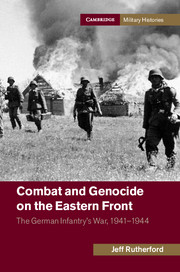Book contents
- Frontmatter
- Table of contents
- List of illustrations
- List of figures
- List of maps
- List of tables
- Acknowledgments
- Introduction
- 1 The Wehrmacht and German society
- 2 Preparations for war
- 3 “Attack with a ruthless offensive spirit and … a firestorm of destruction”
- 4 “Will the continuation of this attackbe worth it?”
- 5 “It is only a question of where, not if, civilians will starve”
- 6 The failure of Operation Barbarossa
- 7 The Soviet winter offensive, 1942
- 8 “The population … shouted out to the interpreter that one would rather be shot instead of being left to starve”
- 9 “From one mess to another”
- 10 “We need to fight to the end, so oder so”
- 11 A more rational occupation?
- 12 “As miserable representatives of themiserable twentieth century, we burnedall of the villages”
- Conclusion
- Bibliography
- Index
- References
Conclusion
Published online by Cambridge University Press: 05 July 2014
- Frontmatter
- Table of contents
- List of illustrations
- List of figures
- List of maps
- List of tables
- Acknowledgments
- Introduction
- 1 The Wehrmacht and German society
- 2 Preparations for war
- 3 “Attack with a ruthless offensive spirit and … a firestorm of destruction”
- 4 “Will the continuation of this attackbe worth it?”
- 5 “It is only a question of where, not if, civilians will starve”
- 6 The failure of Operation Barbarossa
- 7 The Soviet winter offensive, 1942
- 8 “The population … shouted out to the interpreter that one would rather be shot instead of being left to starve”
- 9 “From one mess to another”
- 10 “We need to fight to the end, so oder so”
- 11 A more rational occupation?
- 12 “As miserable representatives of themiserable twentieth century, we burnedall of the villages”
- Conclusion
- Bibliography
- Index
- References
Summary
The primacy of military necessity
Sometime near the midpoint of its occupation, Army Group North compiled a list of several cities in its area of operations and compared their present populations with those of 1934. The decline was eye-opening, if not altogether unexpected. Smaller communities such as Chudovo and Liuban, which numbered 12,000 and 11,800 respectively in 1934, dropped to 4,500 and 7,000 during the German occupation. The larger cities experienced a more drastic depopulation: Pavlovsk fell from 24,000 inhabitants to 1,200; Staraia Russa from 26,700 to 1,500; and, most shockingly, Pushkin from 51,000 to a mere 700. Policies of other German organizations such as the SS and the Economic Staff East actively contributed to this decimation of the Soviet population, but it was the Wehrmacht that exercised real power and authority over these areas and it therefore shoulders the overwhelming responsibility for the events that transpired in the swamps, forests, villages, and cities of northwest Russia.
Unlike the Baltic states, chunks of Belarus, and the majority of Ukraine, northwest Russia proper never passed over to civilian administration: the Wehrmacht controlled this region from fall 1941 to early 1944 without any serious challenge to its sovereignty. Such a situation existed due to the simple fact that the military confrontation with the Soviet Union was never settled. This obvious, yet at times overlooked, reality needs to be kept firmly in mind during any discussion of the German Army’s occupation policy in the Soviet Union. Combat in Army Group North’s area of operations certainly paled in comparison to that on the central and southern sectors of the front, but to the army group and its soldiers battle remained the pre-eminent duty. During 1941 all three divisions fought pitched battles during the advance and the subsequent Soviet counterattacks during the winter.
- Type
- Chapter
- Information
- Combat and Genocide on the Eastern FrontThe German Infantry's War, 1941–1944, pp. 374 - 388Publisher: Cambridge University PressPrint publication year: 2014



